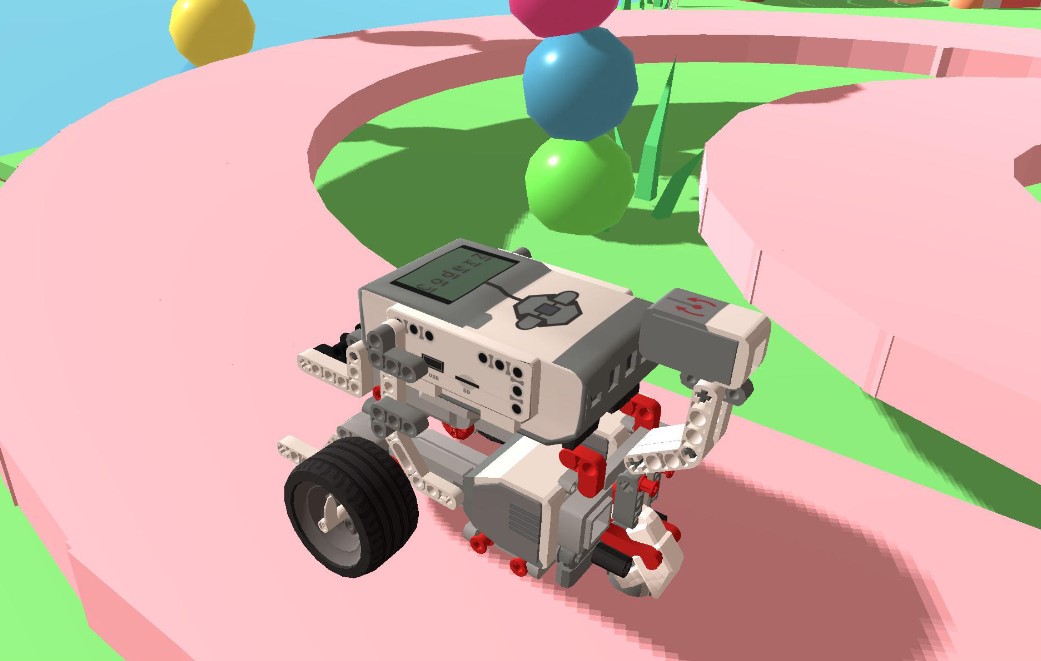5 Ways to Run a Successful Virtual Coding Program
Here’s how one school pivoted to a virtual coding and robotics program when COVID hit

Getting students excited about coding is difficult right now. It’s really hard to get excitement going when they’re not in the classroom with you, working through the intricacies of building robots, writing code, and working on teams. We’re a FIRST LEGO League team school, sponsored by John Deere, so we really scrambled to figure out a new plan when COVID-19 hit.
When we learned about CoderZ and its virtual robotics platform, we were instantly interested. This would give us a chance to continue teaching these advanced classes without having to worry about whether students would or wouldn’t be coming into the physical classroom.
We knew that we could teach students how to code the EV3 robot—similar to our physical robot—virtually. When I recently got together with my class for the first time since March, I pulled the physical robots out of the box and the kids said, “Wow, that’s the robot we’re coding on CoderZ!” They were pretty excited about it, and have done a good job of transitioning over to the virtual learning environment.
Here are five tips that all schools can use to ensure a similar level of success with their own coding programs:
1. Encourage both independence and teamwork. The fact that each student can code his or her own robot virtually is fantastic. When we have to code our physical robots, we do have to work in small groups. There are always “experts” who rise to the top in each group, and everybody relies on them. But when you're coding your own robot, you have to be your own expert, or you have to FaceTime/text/email your friend and say, "Hey, how did you finish Navigation II, Mission 3?" This approach encourages both independent learning and good teamwork.
2. Don’t be afraid to take the plunge. As a teacher of gifted students, all of whom participate in coding competitions, I’m always telling other teachers not to be afraid to put the opportunity on the table and let the kids figure it out. I don't profess to have all of the answers myself, and I, too, had to get over the fear of not knowing the ins and outs of a specific robot or piece of equipment. In moving to the virtual learning environment, I’ve learned more about that EV3 robot than I have in the last five years of teaching coding.
3. Use the related curriculum. Anyone who signs up for the CoderZ League should also be offering the 101 Cyber Robotics Curriculum (as a Title I school, we received an Amazon grant to fund that curriculum). The foundational knowledge that comes with this curriculum has been instrumental in allowing my students to successfully compete in the virtual coding competition. And while they’re pretty proficient with their basic coding, there's so many nuances to the EV3 robot that you have to learn. The CR101 curriculum is easy to use and teacher-friendly. I can pull up a specific PowerPoint presentation, go through the basic information, and then move along to the next learning objective. It’s been great.
Tools and ideas to transform education. Sign up below.
4. Leverage your resources. At one point we were having trouble with Smart Blocks, so I went into the curriculum and pulled up the Smart Block video. We watched it together, stopping the video at different spots to talk about it. That cleared up the problem. I’ve also sent PowerPoints home in Google Classroom and had my students go in and complete specific missions on their own. Along the way, I'm completing the mission, too, and making notes of where I think students may get stuck. Then, at our next session, I'll do a mini lesson on those potential sticking points and talk the kids through those issues.
5. Encourage students to “fail forward.” I've been teaching growth mindset for a few years now. It’s a wonderful tool for working with gifted children, and it includes subjects such as learning from your mistakes and not giving up. We also talk about perseverance and persistence. When a student says, “Oh, I can’t do that,” another one will come back with, “You mean you can’t do that yet.” In other cases, they’ll help one another work through their individual coding challenges, knowing that contributes to the overall success of the team. They’re working collaboratively, knowing that while it’s nice to compete as a group, they're not necessarily competing against one another. They’re all failing forward in some instances…but they are ALL learning in all instances.
Using our virtual coding platform, which I fully expect to keep using even when we return to the classroom full-time, we’ve been able to extend the power of this advanced class while keeping students interested, motivated, and performing.
Khrista D. Henry, Ed. S., is Gifted Educator/First Lego League Coach for the QUEST Program for Gifted and Talented Students at Norris Elementary School in McDuffie County, Georgia.
